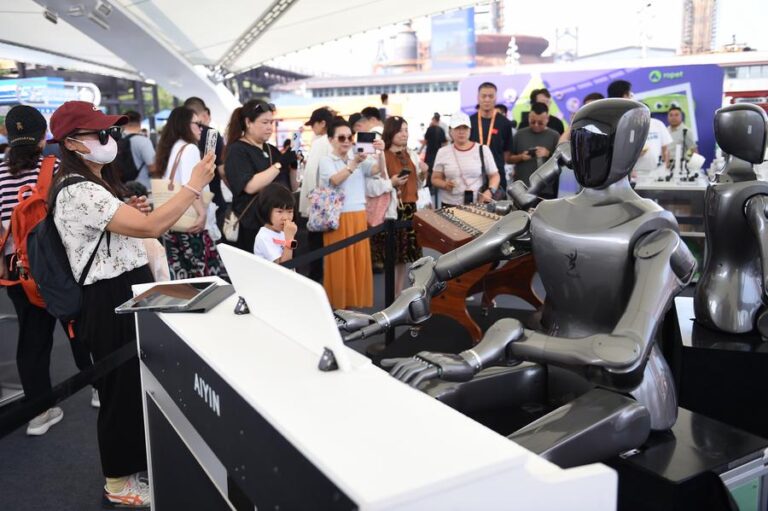BEIJING, Sept. 11 (Xinhua) — Amid the buzz of the ongoing 2025 China International Fair for Trade in Services (CIFTIS), a robot dog is stealing the show. However, this remarkable machine is not just a playful performer; it carries a serious mission.
Equipped with a yellow methane detection probe, it sniffs out potential gas leaks, poised to become a “bodyguard” enhancing community safety.
Zhang Shenyan, a senior R&D engineer at Beijing Gas Group Co., Ltd., explained that this robotic inspector can be pre-programmed with specific routes and key inspection areas, allowing it to conduct regular patrols and safety checks within residential compounds.
The robot dog is just one example of how the new technological revolution, led by artificial intelligence (AI), is permeating every facet of daily life — a trend that has been constant throughout this year’s CIFTIS. Across various themed exhibition halls, AI applications are transforming multiple services trade sectors.
In the health services exhibition hall, Guang’anmen Hospital of China Academy of Chinese Medical Sciences displayed an AI diagnostic robot. People can converse with the “AI doctor” in a consultation room.
Xue Chong, founder of the AI doctor company Trizen, noted that the AI system uses large-model technology and has been trained on a vast array of real case data. It is now capable of conducting traditional Chinese medicine diagnosis such as pulse reading, facial and tongue analysis.
“AI large-model technology has reached a stage focusing on deep integration with specific sectors, and healthcare is an ideal field for AI application,” said Xue.
Xue said they are also developing an AI terminal for home use, paving the way for home-based AI medical services.
The environmental services section also featured its own AI innovation. The company He Mu Ecology presented an eco-dredging robot, capable of performing remote-controlled dredging in urban rivers and underwater environments, as well as cleaning hazardous material from enclosed chemical tanks.
QuantaEye Technologies Co., Ltd. exhibited its “water environment scout,” a floating monitoring device that collects over 10 real-time water quality parameters. Integrated with Internet of Things and big data analysis, it enables dynamic water monitoring and early pollution alerts. The company said that the system is already deployed in several rivers and lakes across Beijing.
Throughout the CIFTIS exhibition halls, a dazzling array of AI applications has drawn large crowds of visitors, all eager to stop and experience the innovations firsthand. Experts across various fields are actively seeking ways to integrate the cutting-edge technology into their respective fields, turning innovative concepts into tangible productivity gains.
In the culture and tourism services zone, visitors lined up to try mixed reality (MR) experiences through wearable devices, immersing themselves in interactive virtual environments or embarking on digital tours of famous landmarks and heritage sites.
Meanwhile, over in the education services zone, exhibitors presented AI-powered support systems tailored for child development. These tools combine health monitoring, personalized tutoring, and physical activity tracking to create a complete growth solution for kids.
Ouyang Rihui, deputy director of the China Center for Internet Economy Research at the Central University of Finance and Economics, noted that in recent years, China’s application and promotion of digital intelligent technologies have led to a surge of new AI products, application scenarios, and service formats.
“These have greatly stimulated and expanded new potential in service consumption,” he added.
Liang Zheng, vice dean of the Institute for AI International Governance at Tsinghua University, said that AI innovation not only reduces the cost and barriers to trade in services through automation and digitalization, but also creates entirely new service formats and business models through intelligence and personalization.
“It is reshaping the present and future of global trade in services,” Liang said.
The theme of this year’s CIFTIS is “Embrace Intelligent Technologies, Empower Trade in Services.” With participation from 85 countries and international organizations, along with nearly 2,000 companies exhibiting on-site, the event will run for five days until Sept. 14.
Since its inception in 2012, CIFTIS has brought together enterprises from around the world to share opportunities stemming from China’s opening up and development of trade in services. ■

